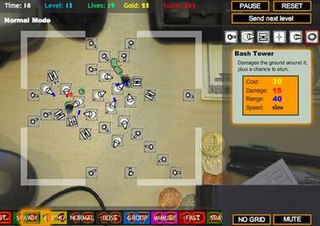
A video game clone is either a video game or a video game console very similar to, or heavily inspired by, a previous popular game or console. Clones are typically made to take financial advantage of the popularity of the cloned game or system, but clones may also result from earnest attempts to create homages or expand on game mechanics from the original game. An additional motivation unique to the medium of games as software with limited compatibility, is the desire to port a simulacrum of a game to platforms that the original is unavailable for or unsatisfactorily implemented on.
A casual game is a video game targeted at a mass market audience, as opposed to a hardcore game, which is targeted at hobbyist gamers. Casual games may exhibit any type of gameplay and genre. They generally involve simpler rules, shorter sessions, and require less learned skill. They don't expect familiarity with a standard set of mechanics, controls, and tropes.

Desktop Tower Defense is a Flash-based tower defense browser game created by Paul Preece in March 2007. The game had been played over 15.7 million times as of July 2007, and was one of Webware 100's top ten entertainment web applications of 2007. Desktop Tower Defense is available in an English, Spanish, German, French, or Italian interface. In May 2009, a commercial Nintendo DS version became available.

Mafia II is a 2010 action-adventure game developed by 2K Czech and published by 2K Games. It was released in August for PlayStation 3, Windows, and Xbox 360. The game is a standalone sequel to 2002's Mafia, and the second installment in the Mafia series. Set within the fictional city of Empire Bay from 1945 to 1951, the story follows Vito Scaletta, a young Sicillian-American mobster and war veteran, who becomes caught in a power struggle among the city's Mafia crime families while attempting to pay back his father's debts and secure a better lifestyle alongside his best friend.

Zynga Inc. is an American developer running social video game services. It was founded in April 2007, with headquarters in San Francisco. The company primarily focuses on mobile and social networking platforms. Zynga states its mission as "connecting the world through games".

Grand Theft Auto: The Ballad of Gay Tony is the second of two episodic expansion packs available for the 2008 video game Grand Theft Auto IV, developed by Rockstar North and published by Rockstar Games. It is the fourth expansion pack in the Grand Theft Auto series, and the fourteenth installment overall. The game was released individually for the Xbox 360 on 29 October 2009, and for the PlayStation 3 and Microsoft Windows on 13 April 2010, as part of a standalone disc-based package titled Grand Theft Auto: Episodes from Liberty City, which also contains Grand Theft Auto: The Lost and Damned and does not require the base game to be played. Microsoft added Episodes from Liberty City to its backwards compatibility list for Xbox One platforms in February 2017.

Mafia Wars is a defunct freemium multiplayer social network game created by Zynga.

FarmVille is a series of agriculture-simulation social network game developed and published by Zynga in 2009. It is similar to Happy Farm, and Farm Town. Its gameplay involves various aspects of farmland management, such as plowing land, planting, growing, and harvesting crops, harvesting trees and raising livestock. The sequels FarmVille 2 and FarmVille 3 were released in September 2012 and November 2021.

FishVille is a defunct real-time aquarium simulation game developed by Zynga, it was available as an application on the social-networking website Facebook. The game allowed members of Facebook to manage virtual aquariums by rearing fish. As of October 2011, FishVille had 1.6 million monthly active users. The game was discontinued on December 5, 2012.
Playdom was an online social network game developer popular on Facebook, Google+ and Myspace. The company was founded in the San Francisco Bay Area by University of California, Berkeley graduates Ling Xiao and Chris Wang and Swarthmore College graduate Dan Yue. In 2009, the market for games played on social networking sites was valued at $300 million, consisting mostly of online sales of virtual goods.
A social network game is a type of online game that is played through social networks or social media. They typically feature multiplayer gameplay mechanics. Social network games were originally implemented as browser games. As mobile gaming took off, the games moved to mobile as well. While they share many aspects of traditional video games, social network games often employ additional ones that make them distinct. Traditionally they are oriented to be social games and casual games.
YoWorld is a browser-based virtual world game which was released on May 8, 2008. It is currently developed by Big Viking Games. The game operates on the freemium model, and is supported through microtransactions, as well as a voluntary in-game ad program. The game itself is free-to-play, however, players can purchase in-game currencies or enroll in special programs and offers to improve their game-play experience or help them progress faster, using real money.

Swift v. Zynga is an ongoing class action lawsuit filed in 2009, based on allegedly deceptive ads that ran in Zynga games on Facebook. A motion by Zynga to dismiss the case was denied by the United States District Court for the Northern District of California in November 2010.
Zynga.org was an independent nonprofit organization started by social games developer Zynga, Inc., in October 2009. The purpose of Zynga.org was to promote and facilitate the use of social games for philanthropic initiatives. It was incorporated as a separate legal entity in March 2012. The organization was dissolved in 2016.

CastleVille is a defunct social network game made by Zynga's Dallas studio and was released in November 2011. It combined a number of elements from the company's other "Ville" range of games. On launch it had received a million "likes" on Facebook. By the end of its first month, it had become the fifth most popular game on Facebook with 26.5 million players. The game was a freemium game, meaning there is no cost to play but players have the option of purchasing premium content.
Pot Farm is a farming simulation social network game developed by Brain Warp Studios and owned by East Side Games. Gameplay involves planting and harvesting different strains of cannabis and manufacturing cannabis-based food items. Many of the plants, quests and achievements are named after elements of cannabis subculture.

Candy Crush Saga is a free-to-play match-three puzzle video game released by King on April 12, 2012, originally for Facebook; other versions for iOS, Android, Windows Phone, and Windows 10 followed. It is a variation of their browser game Candy Crush.

Mafia III is a 2016 action-adventure video game developed by Hangar 13 and published by 2K Games. It was released in October 2016 for PlayStation 4, Xbox One, and Windows, in May 2017 for macOS, and in October 2021 for Google Stadia. It is the sequel to Mafia II and the third installment in the Mafia series. Set within the fictional city of New Bordeaux in 1968, the story follows former criminal and Vietnam veteran Lincoln Clay, who is forced to return to a life of crime to help his adoptive family settle problems with the local branch of the Mafia. After the Mafia betray and murder his family, Lincoln embarks on a quest for revenge while slowly building a criminal empire and seizing power from other criminal organisations in the city.
Amanda Wixted is a computer game programmer and founder of Meteor Grove Software.

The popularisation of mobile games began as early as 1997 with the introduction of Snake preloaded on Nokia feature phones, demonstrating the practicality of games on these devices. Several mobile device manufacturers included preloaded games in the wake of Snake's success. In 1999, the introduction of the i-mode service in Japan allowed a wide variety of more advanced mobile games to be downloaded onto smartphones, though the service was largely limited to Japan. By the early 2000s, the technical specifications of Western handsets had also matured to the point where downloadable applications could be supported, but mainstream adoption continued to be hampered by market fragmentation between different devices, operating environments, and distributors.













